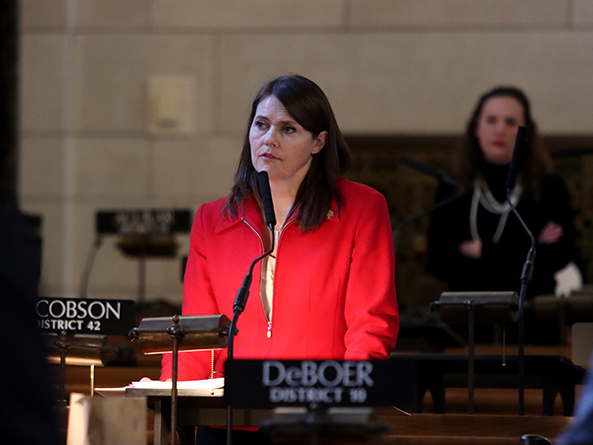Ban on gender-altering procedures for minors advanced after cloture vote
Lawmakers gave first-round approval March 23 to a bill that would ban gender-altering procedures for minors in Nebraska following three days of often emotional debate and a successful cloture motion.

LB574, introduced by Omaha Sen. Kathleen Kauth, would create the Let Them Grow Act. Under the bill, physicians in Nebraska would be prohibited from performing or referring an individual under the age of 19 for gender altering procedures, including surgical procedures, hormone therapy and puberty blockers.
Kauth noted that the bill would not interfere with a practitioner’s ability to provide therapeutic services to minors or refer them to such services.
A physician who knowingly violates the bill’s provisions would be subject to review by the state’s medical licensing board. An individual who received a gender-altering procedure while under age 19, or their parent or guardian, could bring a civil action against the physician within two years of discovery.
The bill also would prohibit the distribution or use of state funds for any entity, organization or individual that provides gender-altering procedures for minors. The provisions of LB574 would take effect on Oct. 1, 2023.
Kauth said the bill is about protecting children who are experiencing gender dysphoria from what she called “dangerous” treatments. Individuals under the age of 19 are not able to fully comprehend the seriousness of undertaking life-altering procedures, she said.
“The prefrontal cortex that controls a [person’s] decision making ability develops into the mid 20s,” she said. “The thought that a child may be experiencing distress and be able to identify that stress as being transgender is logically inconsistent with what we know about children’s decision-making abilities.”
Elkorn Sen. R. Brad von Gillern supported LB574, which he said would safeguard young people from their own “immature” minds. Society doesn’t let kids eat candy for every meal or jump off a roof because they think they’re a superhero, he said, adding that not everything children want is good for them.
“Most kids go through a questioning or denial period where all that they know is up for question,” von Gillern said. “Why would we let a child choose to alter their gender simply because they feel at that moment they’re trapped in the wrong body?”
Speaking in support of the proposal, Brainard Sen. Bruce Bostelman shared a statement released by the Nebraska Board of Health — a panel of health providers and lay people appointed by the governor. The statement cited significant gaps in knowledge regarding the short- and long-term effects of behavioral, medical and surgical interventions for individuals experiencing gender dysphoria, Bostelman said.
Blair Sen. Ben Hansen, who also supported LB574, said the conflicting research presented during debate was evidence that gender-altering care should be reevaluated. When you have conflicting data in any health care field, he said, the prudent thing to do is hold off on performing that kind of care until the science is clear.
“For some reason here, we’re saying [to] absolutely do it in the name of mental health care,” he said. “I don’t know of too many other instances where we actually do that.”
Omaha Sen. Jen Day spoke in opposition to the bill, emphasizing that every major medical organization opposes bans on gender-affirming care. The Nebraska Medical Association, American Medical Association, American Psychological Association and the American Academy of Pediatrics all oppose LB574, she said.
“Why do we, as legislators, think that we know better than physicians?” Day said. “We have no expertise in this area — it is not our place.”
Omaha Sen. Megan Hunt, who spoke about her 12-year-old son Ash’s transition, said gender-affirming care is difficult to obtain in Nebraska. Speaking in opposition to the bill, she said the claim by some senators that health care providers are convincing or coercing youth into believing that they are transgender reflects a misunderstanding of the issue.
“I was so happy to learn I had a son and that my child was growing up and revealing himself to me as he is and that he felt comfortable and safe in doing that,” Hunt said.
Also speaking in opposition to the proposal was Sen. George Dungan of Lincoln, who noted that the bill’s legal standing is unclear. Arkansas recently passed a nearly identical measure, he said, which has been temporarily blocked by the 8th U.S. Circuit Court — in which Nebraska also resides.
The same treatments that are seen as medically sound for non-transgender minors would be banned for transgender youth under the Arkansas bill, he said, which the courts have ruled to be a discriminatory practice.
“Given the fact that LB574 is so similar to [the Arkansas bill], I think we can reasonably believe that the circuit court that we fall under is going to find that it violates equal protection, due process and First Amendment claims,” Dungan said.
Omaha Sen. John Fredrickson also opposed the bill, saying LB574 uses a “fear-based perspective” that commonly has been used in other debates surrounding LGBTQ+ rights. To argue that members of the LGBTQ+ community are confused or will outgrow their identity is insulting and dehumanizing, he said.
“If this were actually about protecting kids, I imagine the conversation we would be having is something along the lines of, ‘How can we ensure that these kids are getting the best support available?’” Fredrickson said. “But the conversation that’s been had is around banning, eliminating [and] restricting.”
After eight hours of debate spanning several days, Kauth filed a motion to invoke cloture, which ceases debate and forces a vote on the bill and any pending amendments.
The motion was successful on a vote of 33-16. Thirty-three votes were needed.
Senators then voted 30-17 to advance LB574 to select file.


